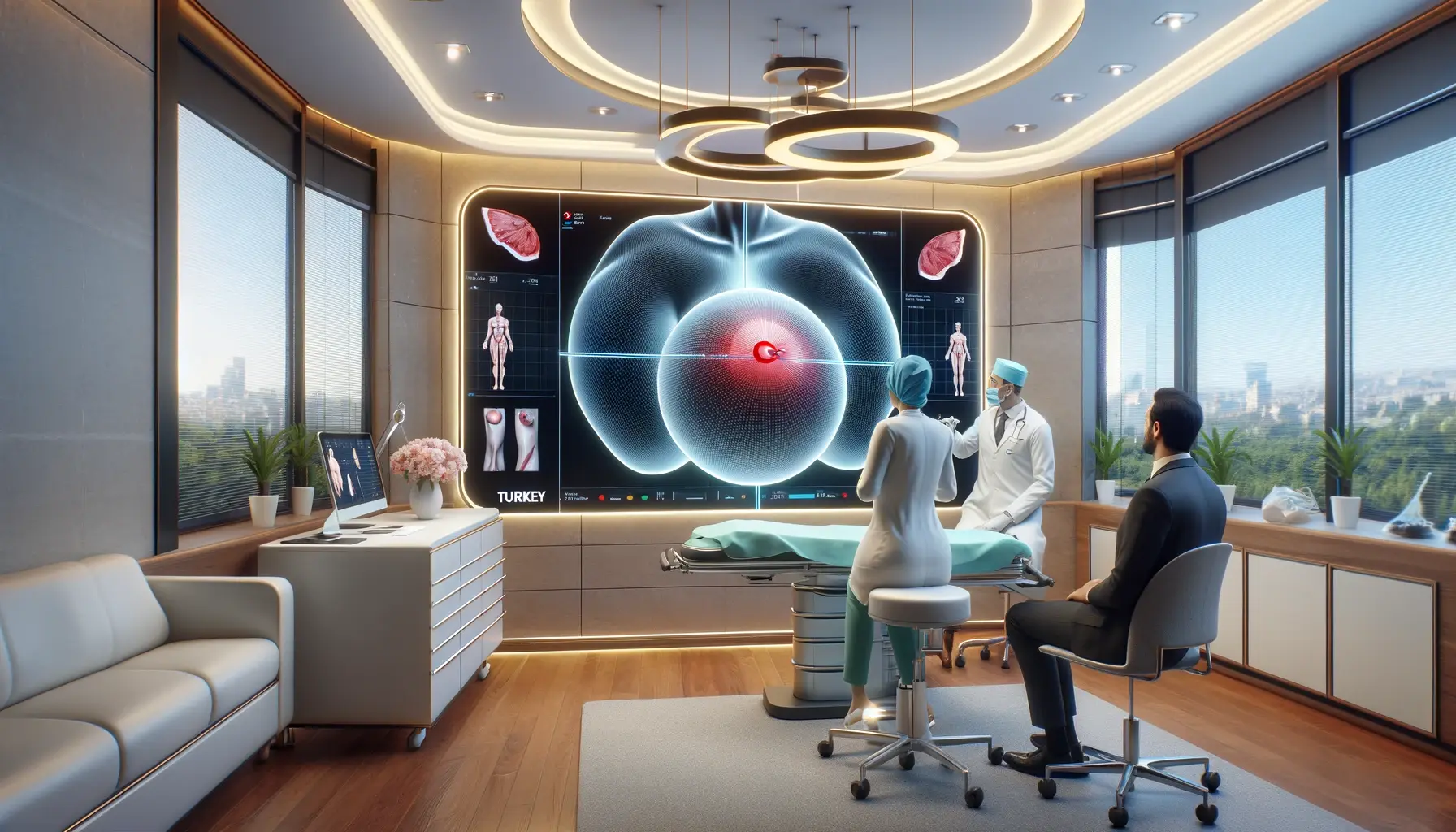It is worth noting that the widespread development of plastic surgery through the integration of innovative technologies is clearly demonstrated in Turkey.
ROBOT-ASSISTED SURGERY IS AT ITS PEAK
The modern revolution of plastic surgery is clearly demonstrated by its robotization. For example, complex robotic systems, such as the famous Da Vinci surgical system, have been widely implemented in Turkey. Their use provides precision and allows them to take control over the course of the operation. The result is a reduction in invasive penetrations and minimization of scars. This allows patients to recover faster after surgery. Robotics in surgery makes it possible to overcome existing limitations and show previously unattainable results.
THE INTEGRATION OF ADVANCED IMAGING AND SIMULATION TECHNOLOGIES
Parallel to the rise of robotic-assisted surgeries, the Turkish plastic surgery sector has seen the integration of cutting-edge imaging and simulation technologies. For example, The VECTRA 3D Imaging System coffees surgeons high-resolution, three-dimensional visualizations of the patient's anatomy. This tool is invaluable for crafting personalized surgical plans and aligning with physical characteristics and aesthetic aspirations of each patient.
VR and AR allow us to visualize the exact result by technology. These will increase the physician's awareness and create realistic patient expectations.
EMPHASIZING PATIENT SAFETY AND COMFORT
At the heart of Turkey's revolution in plastic surgery lies an unwavering commitment to patient safety and comfort. The adherence to safety is demonstrated by the implementation of the most advanced monitoring systems, leading edge anesthesia protocols and strict infection control measures. These initiatives together minimize the risks after surgery and create a more comfortable environment for patients.
ADVANCEMENTS IN NON-INVASIVE PROCEDURES: REDEFINING RECOVERY AND RESULTS
The landscape of plastic surgery in Turkey is not solely defined by the monumental strides in surgical robotics and imaging technologies but also by the significant advancements in non-invasive procedures. Plastic surgery in Turkey is defined by high advances in non-invasive procedures, the field of surgical robotics and imaging technologies. They offer patients less invasive safe options with minimal recovery time. Prominent among them are laser procedures and injectables that provide transformative results without the need for traditional surgery.
Laser technology has also advanced significantly. New devices precisely identify and treat skin problems with minimal discomfort. The flexibility and effectiveness of laser treatments have made them the cornerstone of non-invasive cosmetic procedures in Turkey. These technologies contribute to Turkey's endeavor to integrate technology to improve patient outcomes.
Injectable procedures such as botulinum toxin and dermal fillers are also experiencing a renaissance. Their advanced formulas and application methods promise natural-looking results. Skillful use of injections allows you to remove signs of aging, restore and even model facial features without surgical incisions. This has particularly appealed to patients seeking subtle enhancements or those wishing to avoid the risks and downtime associated with surgery.
THE ROLE OF AI AND MACHINE LEARNING IN PERSONALIZED CARE
Artificial Intelligence (AI) and machine learning have begun to play a crucial role in personalizing patient care within the realm of plastic surgery. By analyzing vast datasets, these technologies can predict outcomes more accurately, tailor treatment plans to individual patient profiles, and even assist in identifying the most effective techniques for unique concerns. In Turkey, where the emphasis on personalized patient experiences is paramount, the adoption of AI-driven tools signifies a leap towards more predictive, personalized, and efficient care delivery.
AI's role extends beyond patient consultation and planning. It is instrumental in enhancing surgical precision through predictive analytics and real-time guidance during procedures. This not only improves the accuracy of surgeries but also contributes to safety by anticipating potential complications before they arise. Machine learning algorithms, through their ability to learn from each procedure, continuously refine their predictions, making each subsequent surgery safer and more tailored to patient needs.

THE FUTURE OF PLASTIC SURGERY WITH BIOTECHNOLOGY AND REGENERATIVE MEDICINE
Looking forward, the integration of biotechnology and regenerative medicine into plastic surgery holds the potential to redefine the very foundations of the field. Research into tissue engineering, stem cells, and growth factors is paving the way for regenerative procedures that can repair damaged tissues, improve skin quality, and even reverse the signs of aging at the cellular level. In Turkey, initiatives to incorporate these cutting-edge treatments into plastic surgery protocols underscore the country's dedication to leading the future of healthcare innovation.
The convergence of plastic surgery with regenerative medicine not only promises enhanced aesthetic outcomes but also offers hope for more comprehensive and lasting solutions to a range of conditions. From scar treatment to the rejuvenation of aging skin, the potential applications are vast and varied, marking a new era in cosmetic and reconstructive surgery where the healing and regenerative capacities of the human body are harnessed to achieve unprecedented results.
BRIDGING THE GLOBAL GAP: TURKEY'S CONTRIBUTION TO THE INTERNATIONAL PLASTIC SURGERY COMMUNITY
Turkey's pioneering role in the evolution of plastic surgery, driven by its embrace of cutting-edge technologies and non-invasive techniques, has not only transformed the local healthcare landscape but also significantly contributed to the global discourse on cosmetic and reconstructive surgery. By setting new standards of care, Turkey is bridging the gap between traditional surgical methods and the future of personalized, technologically advanced procedures. This global influence is evident in the increasing number of international patients seeking plastic surgery in Turkey, drawn by the country's reputation for combining excellence in medical expertise with the latest in technological innovations.

ESTABLISHING NEW BENCHMARKS IN PATIENT CARE AND SATISFACTION
The integration of robotic-assisted surgeries, advanced imaging, and AI-driven personalization in Turkey's plastic surgery clinics has established new benchmarks in patient care. These technological advancements not only ensure superior precision and safety but also significantly enhance patient satisfaction by offering tailored treatments and predictable outcomes. The focus on minimizing invasiveness and maximizing comfort has made plastic surgery more accessible and appealing to a broader audience, thereby increasing the acceptance and demand for cosmetic procedures worldwide.
Turkey's approach to patient care extends beyond the operating room. The country's plastic surgery clinics and hospitals emphasize holistic patient experiences, incorporating comprehensive preoperative consultations and post-operative care plans. This patient-centric approach, supported by technology, ensures that individuals are fully informed, comfortable, and supported throughout their surgical journey, setting a standard that is becoming a model for clinics around the world.
DRIVING INNOVATION AND RESEARCH IN PLASTIC SURGERY
The commitment to technological advancement in Turkey has spurred a culture of innovation and research within the plastic surgery field. Turkish plastic surgeons and researchers are at the forefront of exploring new technologies, techniques, and treatments that promise to further enhance the efficacy and safety of cosmetic procedures. This vibrant research environment not only contributes to the global body of knowledge in plastic surgery but also ensures that Turkey remains at the cutting edge of medical science.
Collaborations between Turkish plastic surgeons, international experts, and technology companies are fostering a global community of practice that shares insights, challenges, and solutions. Through conferences, journals, and professional networks, Turkey is contributing to a worldwide dialogue on the future of plastic surgery, ensuring that the benefits of its technological advancements are shared across borders.
THE ETHICAL IMPLICATIONS AND FUTURE CONSIDERATIONS
As Turkey advances the frontiers of plastic surgery with technology, it also navigates the complex ethical considerations inherent in such rapid progress. Issues surrounding patient consent, privacy, and the equitable access to high-tech treatments are at the forefront of the discourse within the Turkish medical community. By addressing these challenges head-on, Turkey is setting ethical standards that accompany technological innovation, ensuring that progress in plastic surgery is both responsible and patient-focused.
Looking to the future, Turkey's trajectory in plastic surgery hints at a world where the boundaries of what is medically possible are continually expanded. The integration of regenerative medicine, biotechnology, and even artificial intelligence into plastic surgery practices suggests a future where aging and physical limitations are addressed not just at the surface level, but through profound, lasting transformations at the cellular and genetic levels.
TURKEY'S POTENTIAL FOR HEALTH CARE MODERNISATION
Turkey's revolution in plastic surgery represents a microcosm of the potential for technology to transform healthcare. By embracing the latest advancements in robotics, AI, and regenerative medicine, Turkey is not only enhancing the safety and precision of plastic surgery but also redefining the very nature of patient care and satisfaction. As the country continues to innovate and share its knowledge with the global community, it paves the way for a future where the benefits of such technological integration are accessible to all, ensuring that the revolution in plastic surgery continues to evolve, guided by the principles of excellence, ethics, and equity.
This exploration of Turkey's role in the technological transformation of plastic surgery highlights a broader trend in healthcare: the move towards more personalized, precise, and patient-friendly treatments. As we witness this revolution unfold, it becomes clear that the future of plastic surgery, and indeed all of healthcare, lies in the harmonious integration of technology and human expertise, with Turkey leading the way.
Sources:
